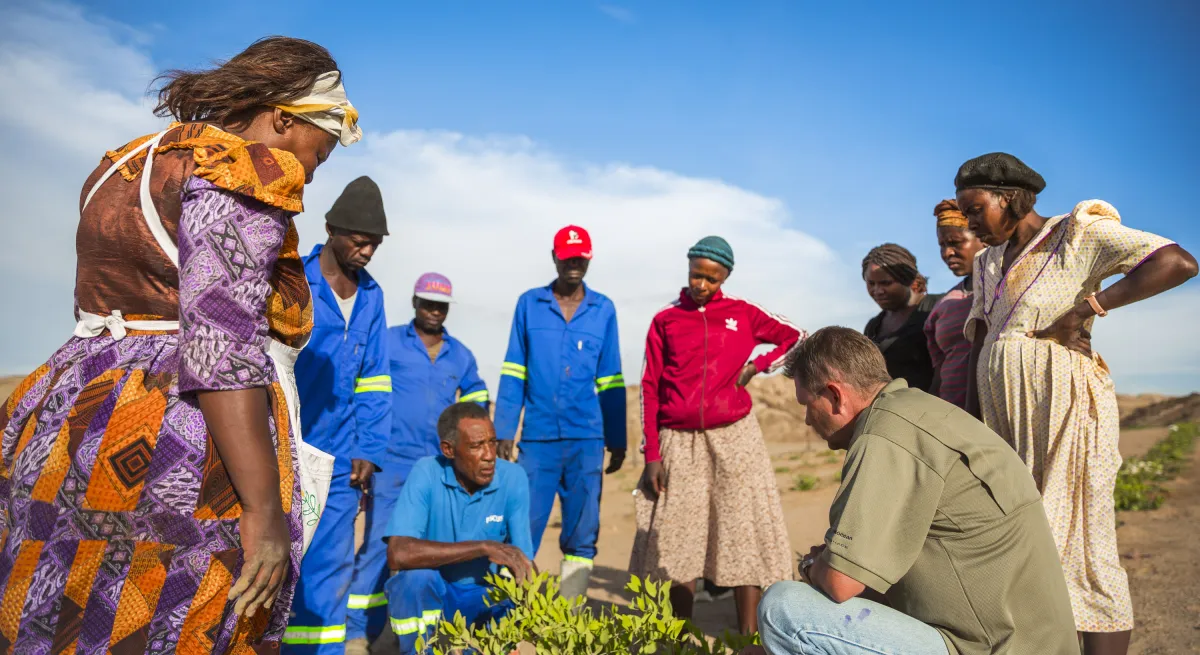The project Jojoba for Namibia was founded only five years ago by visionary German-Namibian entrepreneur Oliver Rust.
Together with the Julius Baer Foundation’s support, he turned his idea into a very successful project, leading over 1,000 marginalised women to successful entrepreneurship and independence.
In the meantime, the project is backed by committed Julius Baer client and philanthropist Patrizia Stalder, who is ensuring the continuity of this thriving initiative through her donations and personal engagement while giving voice to her values and continuing on her own philanthropic journey.
Q: Patrizia Stalder, what was your motivation for getting actively involved in a project of the Julius Baer Foundation?
After receiving an inheritance, I felt the desire to invest parts of it in a good cause.
I was meeting with my Julius Baer relationship manager and mentioned that I was looking for a project I could support.
He pointed me to the Julius Baer Foundation and explained that it invited private clients to become co-funders.
To understand the challenges of a country, it is essential to get in touch with the local population and see the situation for yourself on the ground. These contacts help us gain a much better understanding and enable us to provide more targeted stepping-stones.
Q: How did you connect with the Foundation?
My relationship manager sent me an invitation to an event organised by the Foundation. The Bank’s philanthropy adviser presented the various projects they were supporting at the time, and that evening, I had a chance to personally speak with her. I was curious and eager to know more. As a follow-up, we organised a private meeting to carve out my ideas and have the Foundation suggest matching projects.

Q: How did you find the project that suited you best?
It was a challenging process, and the Foundation was very committed and competent in finding the perfect match. A project in Africa that supported women in becoming entrepreneurs seemed perfect. I wanted to engage in an initiative that supported women to be independent. I wished to be part of a ‘start-up initiative’ where I could act as a catalyst and witness development. And, it was important to me that I could visit the project and see it for myself. I could feel how connected the Foundation was to the projects and their founders. Becoming a part of that network and connecting with the project leaders of Jojoba for Namibia was a natural and integral part of my participation.

Q: What was your impression of the Jojoba For Namibia project?
I was very impressed by Oliver Rust and his team of women! He turned his idea into a vision and into a concrete project leading over 1,000 women to financial independence.
Oliver Rust is a wonderful leader empowering and motivating women with his enthusiasm while continuously finding ways to alleviate the lives of the women and their families. I was impressed by the cordiality and gratitude that I felt from the women and their families. They are so proud of what they have been able to accomplish. You can feel the inner strength and energy that they have gained through the work, responsibility and commitment.
The project goes beyond granting the women an opportunity to earn money. It improves the living conditions of the whole communities through sturdy mud houses, greenhouses and water tanks for potable water. In trading hubs, the women can sell the harvested and processed produce following a circular economy.
Q: The Julius Baer Foundation supports projects that link the privileged and the disadvantaged, enabling wins for both. What is your personal win?
This type of pro bono work is a wonderful counterbalance to my other professional obligations. The focus of this work is not profit maximisation, but rather deciphering problems, understanding them and finding a solution. It is wonderful, fulfilling work that I am grateful to have time for.
After returning from Namibia the first time, I learned about the association here in Switzerland called ‘Jojoba für Afrika’ that directly supports the project in Namibia. It was clear to me that I would participate to stay connected with the project. Meanwhile, I am an active board member. This work has provided me with so much knowledge about another country, culture and their people. I have built so many relationships and friendships that would not have come into existence in any other way. It is a wonderful way to experience unique and enriching encounters while helping to reduce inequalities a fair bit.
Did you enjoy this exchange?
If you are a researcher or specialist in inequality reduction issues, write to us and let's talk.
